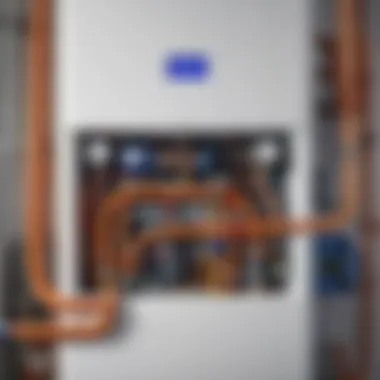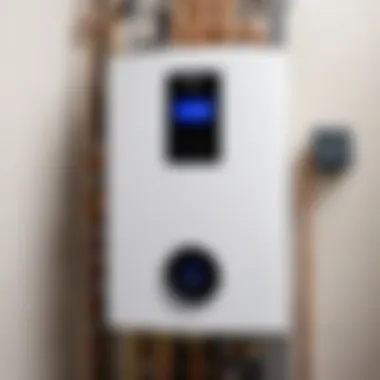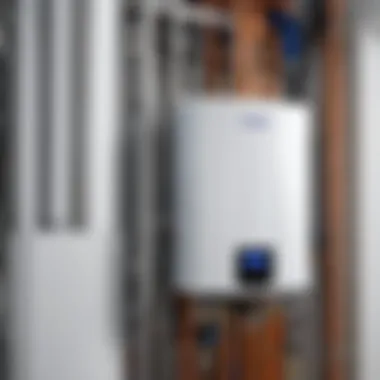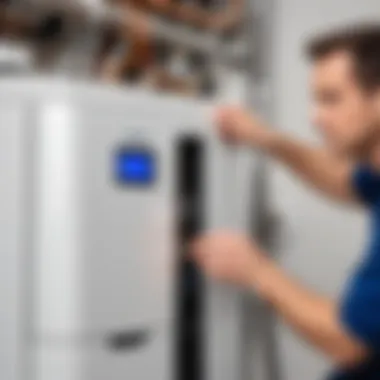Troubleshooting Your Navien Boiler's Heating Issues


Intro
Navien boilers are known for their efficiency and effectiveness in providing warmth through radiator heating systems. However, sometimes homeowners face difficulties with the heating performance of their Navien boilers. Understanding the underlying issues is crucial for proper diagnostics, repairs, and maintenance. This article delves into these common problems, examines potential causes, and offers guidance on best practices to ensure your system operates efficiently.
We will explore key factors impacting heating performance, possible solutions, and maintenance tips. Each section aims to equip you with the knowledge necessary to tackle heating issues effectively.
Проектирование и планирование
Как выбрать проект для DIY
Before attempting any repairs on your Navien boiler, it's vital to assess your skills and determine if a DIY approach is feasible. Identifying a clear project plan can save significant time and reduce the risk of exacerbating existing issues. Consider the following when selecting your project:
- Evaluate your experience: Are you familiar with boiler systems? If not, seeking professional help may be wiser.
- Define specific problems: Pinpoint the exact heating issues you are experiencing, like uneven heating or low water temperatures.
- Resources required: List tools and materials you will need for your project.
Оценка времени и ресурсов
Proper assessment of the time and resources is essential for a successful repair or maintenance task. Allocate enough time for each step, considering factors like your familiarity with the process and potential complications that may arise. Here are some tips:
- Create a timeline: Establish a realistic schedule based on the complexity of the project.
- Consider help: If the task is too complex, involving a heating specialist can be beneficial.
- Gather all materials before you begin: Ensure you have necessary parts, tools, and any required manuals at your disposal.
Common Heating Issues
Your Navien boiler might face several issues that hinder its heating capability. Understanding these can lead to quicker resolutions. Here are typical problems:
- Air in the System: Air pockets in the radiator can disrupt the flow of hot water. Bleed your radiators to release trapped air.
- Thermostat Malfunction: A faulty thermostat can result in inaccurate readings. Check calibration and consider replacing if needed.
- Clogged Pipes: Mineral build-up or dirt in the pipes can diminish heating efficiency. Regular flushing can alleviate this.
Solutions and Maintenance Recommendations
To maximize the performance of your Navien boiler, address any identified issues promptly. Here are strategies to consider:
- Regular Maintenance: Schedule annual check-ups to catch potential issues early.
- Clean the Boiler: Keep the unit clean and free of dust to enhance efficiency.
- Upgrade Components: Replacing old parts can significantly improve performance.
"Regular maintenance is key to ensuring optimal heating performance and prolonging the lifespan of your boiler."
Understanding the specifics of Navien boiler performance can aid in implementing effective solutions to common problems. Being diligent about maintenance will not only enhance heating efficiency but also prevent further costly repairs.
Preface to Navien Boilers
Understanding Navien boilers is cruciaL for anyone looking to maintain an effective heating system. These devices are widely regarded for their energy efficiency and advanced technology. Knowing how they wOrk and where they are commonly used can help users optimize their heating performance.
Navien produces a variety of heating solutions, including condensing combi boilers and heat-only boilers. Their technologies prioritize efficiency, allowing users to save on energy costs while ensuring a comfortable environment. This section highlights the key aspects of Navien boilers, including their innovations and common applications, enabling readers to grasp their significance in modern heating solutions.
Overview of Navien Boiler Technology
Navien boilers utilize cutting-edge technology to provide efficient heating. One prominent feature is the condensing process, where flue gases are recycled to extract more heat. This results in higher efficiencies, often exceeding 90%. The condensing method minimizes energy waste and lowers emissions. Moreover, Navien boilers incorporate advanced controls, enabling precise temperature regulation.


These appliances often feature dual stainless steel heat exchangers. This construction improves heat transfer, enhancing overall efficiency. Additionally, Navien's systems can adapt to varying heating loads, responding dynamically to the user's needs. The technology ensures effective operation even in challenging conditions.
Common Applications of Navien Boilers
Navien boilers serve in various settings due to their versatile design. Common applications include:
- Residential: Many homeowners rely on Navien boilers for central heating and domestic hot water. Their compact size allows for easy installation in smaller spaces, such as apartments.
- Commercial: Facilities like restaurants and hotels, where high demands for hot water exist, benefit significantly from the performance of Navien systems.
- Hydronic Heating: In hydronic systems, Navien boilers efficiently meet heating demands while providing hot water for radiant floor heating systems.
- Retrofits: Older systems can be updated with Navien technology, enhancing energy efficiency and overall comfort in existing buildings.
In each of these applications, the focus remains on reducing operational costs while improving comfort. Such versatility makes Navien a popular choice in the heating market of today.
"Navien's commitment to innovation allows users to experience unparalleled heating efficiency with cutting-edge design."
Indicators Your Boiler Is Not Heating
Identifying when a Navien boiler is not heating effectively is critical for maintaining comfort and efficiency in a home or workspace. A boiler that is functioning properly should deliver a constant and adequate heating output. When it fails to do so, it can lead to discomfort and potentially even costly repairs if the issues are not addressed promptly. Understanding the indicators that your boiler is not heating as it should enables homeowners or technicians to take timely action and resolve any underlying problems.
Some of the key indicators to watch for include unexpected cold spots in radiators, unusual noises from the boiler, or fluctuating temperature levels. When these symptoms arise, it is essential to assess the situation quickly to determine whether there are any malfunctions that could be resolved through troubleshooting or if professional assistance might be necessary.
Symptoms of Insufficient Heating
The symptoms of insufficient heating can manifest in various ways. Some common signs include:
- Cold radiators: If your radiators are not warming up evenly or remain cold despite the boiler running, this is a clear signal of an issue.
- Excessive noise: Any clanking or gurgling noises coming from the boiler might indicate trapped air or other complications within the system.
- Inconsistent temperatures: If different rooms are experiencing abnormal temperature variations, this could suggest blockages or circulation problems within the system.
- Thermostat issues: A malfunctioning thermostat may lead to inaccurate readings, causing the system to overheat or underheat.
These indicators can help identify specific issues affecting the heating performance of a Navien boiler. It is vital to watch for these symptoms to facilitate early detection and efficient resolution of any heating problems.
Troubleshooting Initial Issues
Troubleshooting initial heating issues is an important step before calling in a professional. Here are some basic steps to diagnose problems:
- Check the thermostat settings. Ensure the thermostat is set to the appropriate heating level and is functioning properly.
- Examine the circuit breaker. A tripped circuit breaker may prevent the boiler from operating correctly, so checking this is essential.
- Inspect the boiler pressure gauge. The gauge should typically indicate a pressure level between 1 to 1.5 bars. Low pressure may necessitate a refill.
- Bleed the radiators. Bleeding radiators can remove trapped air, which may affect heating performance. This is often a straightforward task.
- Look for leaks. Inspect the boiler and surrounding pipes for any signs of water leaks, which can affect heating efficiency.
By systematically following these troubleshooting steps, users can often pinpoint the source of heating failures and take appropriate measures. Successfully addressing these issues can significantly improve the heating performance of the Navien boiler, ensuring a comfortable and operational heating system.
Potential Causes of Heating Failures
Understanding the potential causes of heating failures in Navien boilers is crucial for effective troubleshooting and maintenance. This subsection focuses on the problems that can arise, helping owners identify symptoms and act accordingly. The importance lies in addressing these issues promptly to prevent further damage to the boiler or the heating system as a whole. By recognizing and understanding these causes, users can ensure their heating systems operate optimally, leading to increased comfort and efficiency.
Air Trapped in the System
Air trapped in the heating system can cause significant issues in performance. When air bubbles form within the pipes, they can block the flow of hot water, leading to uneven heating throughout the radiators. It is essential to bleed radiators regularly to release any trapped air. This can be done using a radiator key. When bleeding a radiator, open the valve slightly until water starts to flow out steadily. This process should be repeated for each radiator in the system.
Low Water Pressure
Low water pressure is another common culprit for heating failures in Navien boilers. If the water pressure drops below the recommended level, the boiler may not function efficiently. The water pressure gauge should be regularly monitored. If the pressure is low, it can often be restored by adding water to the system through the filling loop. Always refer to the boiler manual for specific guidance on adjusting pressure levels. Additionally, regular checks will help identify leaks that may lead to persistent low water pressure.
Faulty Thermostat Settings


The thermostat regulates the temperature of the water in the heating system. If the settings are incorrect, the boiler may not heat the water sufficiently. It is important to check whether the thermostat is set to the desired temperature. Ensure it is functioning correctly and has no obstructions that prevent it from reading the temperature accurately. Replacing faulty thermostats can significantly improve heating performance.
Blockages in Heating Pipes
Blockages in the heating pipes can restrict the flow of hot water, impacting the overall heating efficiency. Common blockages can be caused by sediment buildup or corrosion over time. Regular maintenance should include inspecting the pipes for any signs of blockage. Flushing the system may be necessary in some cases to remove debris. Keeping the pipes clear ensures consistent heat distribution to all radiators.
Issues with the Circulator Pump
The circulator pump is essential for moving heated water through the system. If the pump malfunctions, it can lead to a significant loss in heating performance. Signs of a failing circulator pump include unusual noises, lack of heat in radiators, or irregular water pressure. It is advisable to check the pump regularly and listen for any irregular sounds. In case of failure, replacing the pump may be the only option to restore heating efficiency.
Regularly checking these potential causes can prolong the lifespan of your Navien boiler and enhance its heating performance.
By addressing these issues early, users not only improve the immediate performance of their heating systems but also minimize the risk of costly repairs in the future.
Maintenance Practices for Optimal Performance
Maintaining your Navien boiler is essential for ensuring optimal heating performance. Regular maintenance not only enhances efficiency but also prolongs the lifespan of the boiler. When a boiler is neglected, it can lead to a myriad of heating issues, including inconsistent temperatures and increased energy bills. This section outlines key maintenance practices that will help improve the functionality of your heating system.
Regular Boiler Maintenance
Regular maintenance of a Navien boiler involves systematic checks and servicing to ensure it operates effectively. Schedule maintenance checks at least once a year. This proactive approach can help identify potential issues before they escalate into more significant problems.
Key components to assess during maintenance include:
- Flush the system to remove any buildup of sediment or debris.
- Inspect the burner and cleaning if necessary to prevent inefficiencies.
- Examine the heat exchanger for signs of wear or corrosion.
By adhering to a maintenance schedule, homeowners can avoid sudden breakdowns and costly repairs. The importance of regular servicing cannot be overstated as it contributes significantly to maintaining a safe and effective heating environment.
How to Bleed Your Radiators
Bleeding radiators is another critical maintenance task for ensuring effective heating performance. Air can become trapped in the radiator, resulting in cold spots and inadequate heating. This task requires minimal tools and effort, making it an accessible upkeep point.
To bleed your radiators, follow these steps:
- Turn off your heating system to avoid any hot water spillage.
- Locate the bleed valve, usually at the top of the radiator.
- Use a radiator key to slowly open the valve. You will hear a hissing sound as air escapes.
- Once water begins to flow steadily from the valve, close it.
- Check the system pressure afterward, as bleeding can lower it slightly.
Bleeding improves the efficiency of the heating system, and homeowners should aim to do this annually or whenever they notice cold spots.
Maintaining Water Pressure Levels
Water pressure levels are crucial for effective heating in a Navien boiler. If the pressure drops too low, the system may struggle to heat radiators adequately, leading to discomfort during colder months. Ideal pressure levels typically range from 1 to 1.5 bars when the system is cold.
Monitor pressure regularly by checking the built-in gauge. If pressure falls below the recommended level, it may be necessary to add water to the system. This process involves:
- Turning off the boiler and allowing it to cool.
- Locating the filling loop, which connects the water supply to the boiler.
- Open the valves on the filling loop slowly until the pressure rises to the desired level.
- Close the valves and check the gauge once more.
By routinely checking and maintaining proper water pressure, you can prevent heating inefficiency and other related issues.


Checking and Cleaning Filter Screens
The filter screens in a Navien boiler play an important role in maintaining efficiency. Over time, dust, debris, and mineral deposits can accumulate, obstructing the flow of water and air. This blockage can significantly hinder heating performance.
To keep filter screens functioning optimally, follow these steps:
- Turn off the boiler and disconnect it from power to ensure safety.
- Locate the filter screens, usually found near the pump or main connections.
- Carefully unscrew or detach the screens for cleaning.
- Use clean water to flush any dirt, or replace them if they are damaged.
- Reassemble the screens and turn the boiler back on.
Regularly cleaning the filters reduces strain on the system and allows for efficient heating. It is advisable to check the filter screens every season.
Regular maintenance practices form the backbone of effective heating and can save homeowners time and money later. By taking these steps, you can ensure that your Navien boiler functions smoothly throughout the heating season.
When to Seek Professional Help
Understanding when to seek professional help for your Navien boiler is crucial in maintaining its heating performance. Attempting to resolve complex issues without the necessary knowledge or experience can result in further damage or ineffective solutions. Furthermore, professionals can provide peace of mind with their expertise. This section will explore the signs and considerations that indicate it's time to call in a technician.
Signs That Indicate Professional Assistance Is Needed
Several indicators suggest that your Navien boiler requires professional intervention. Here are key signs to look for:
- Persistent Heating Issues: If you have performed basic troubleshooting but the heating performance remains inadequate, this may point to deeper issues.
- Unusual Noises: Sounds such as banging, hissing, or whistling can indicate problems within the unit that require specialist assessment.
- Error Codes Displayed: Modern Navien boilers have diagnostic features that display error codes. If you encounter these codes, refer to the manual for guidance; however, persistent codes typically necessitate professional evaluation.
- Fluctuating Temperatures: If there are inconsistencies in heat output or your home’s temperature varies significantly, these are strong indicators of functional problems.
- Leaks or Moisture: Any sign of water leakage around the boiler is a clear sign of a malfunction, which should be addressed immediately to avoid further complications.
"Ignoring these signs may lead to costly repairs and potential hazards in your home."
Choosing a Qualified Technician
When selecting a technician for your Navien boiler, careful consideration is vital to ensure the person you choose has the appropriate qualifications and experience. Here are some essential factors to consider:
- Certification and Licensing: Make sure the technician has the necessary licenses specific to heating and boiler repairs. This guarantees that they are trained to handle your type of equipment safely.
- Experience with Navien Products: Look for professionals who have specific experience with Navien boilers, as they will be familiar with the common issues associated with this brand.
- References and Reviews: Seek recommendations from other homeowners or check online platforms such as reddit.com or facebook.com for reviews and ratings of their services. Real-life experiences can provide valuable insights into reliability and service quality.
- Insurance: Verify that the technician has insurance coverage to protect against any potential damages or accidents during repair work.
- Service Warranty: Inquire if the technician offers a warranty on their work. A good technician stands by their services and will offer guarantees on repairs made.
By recognizing the signs that demand professional assistance and by carefully selecting a qualified technician, homeowners can ensure the long-term reliability and efficiency of their Navien boiler.
Culmination
More importantly, it emphasizes the necessity of being proactive rather than reactive when it comes to boiler maintenance. Ignoring minor issues can lead to more significant problems and costly repairs. Thus, understanding the signs that indicate potential heating failures is essential.
One should not neglect the role of professional technicians—sometimes, expert input is invaluable in accurately diagnosing persistent problems. The accumulated information provides a framework for users to maintain their systems effectively and to respond appropriately when further assistance is required.
Summarizing Key Points
- Understanding Symptoms: Recognizing early warning signs of heating issues is crucial. Symptoms include uneven heat distribution and excessively high energy bills.
- Common Causes: Potential causes like air trapped in the system, low water pressure, or faulty thermostat settings can drastically affect heating performance.
- Regular Maintenance: Implementing a consistent maintenance strategy can prevent many common issues and prolong the boiler's lifespan. This includes bleeding radiators, ensuring proper water pressure, and regularly checking filters.
- Professional Help: Knowing when to call a qualified technician can save time and resources and offer peace of mind.
Through the understanding of these points, users can create a reliable heating environment that not only operates efficiently but also enhances energy efficiency and comfort.
Encouragement for Regular Maintenance
Regular maintenance goes beyond just keeping the boiler running; it is an essential investment in safety, efficiency, and long-term performance. By committing to a scheduled maintenance routine, users can prevent many of the issues outlined in this article.
The benefits of regular maintenance include:
- Enhanced Efficiency: A well-maintained boiler operates more efficiently, saving money on energy costs.
- Reduced Breakdowns: With routine checks, minor issues can be identified and fixed before they develop into larger problems that require costly repairs.
- Prolonged Lifespan: Regular care can extend the overall lifespan of the boiler, providing more value for the investment made.
- Safety Assurance: Maintenance helps ensure that the boiler is operating safely, reducing the risk of malfunctions that can lead to hazardous situations.
In summary, comprehending the significance of boiler performance, its common issues, and the impact of regular maintenance can lead to a more effective heating solution. For designers, builders, and maintenance professionals, this knowledge is instrumental in delivering quality service and improving client satisfaction.







